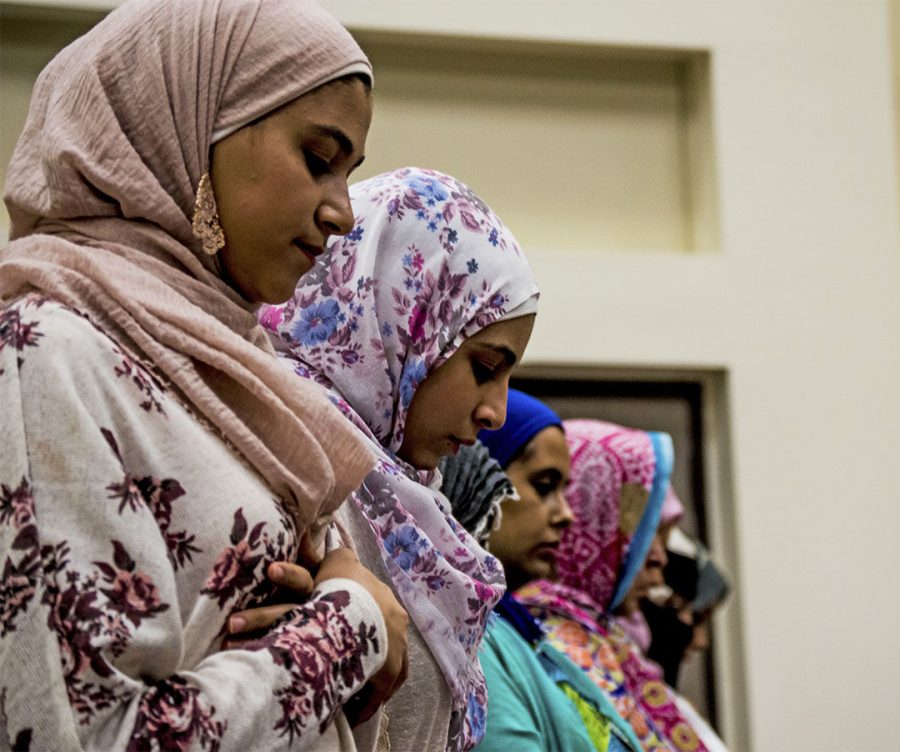A Test of Faith: Practicing Islam at a Catholic, American university
During college years, students face the difficult task of establishing a balance between their academic life and other involvements. This balancing act is especially difficult for Muslim students who are striving to meet the demands of their religion while also schooling in a western culture into which Islam does not fit naturally.
Rima Yousuf is a Biology student at St. Edward’s University. She is a Muslim and attests to the difficulties in practicing Islam not only in a westernized culture but also in a college culture.
Islam, like many religions, sets some requirements for its followers. And while many Muslims customize these requirements and adhere to them at a variety of levels, these requirements are generally held as important to Muslims around the world.
Prayer
For Yousuf, her faith has been very important to affirming her identity since she is in the United States alone with her family living in Dubai. Yousuf strives to pray 5 times a day, eat halal foods and dress modestly as required by her faith. But prayer, Yousuf says, has been the most difficult to navigate especially being a full-time student.
Although there are no policies in place that make provision for prayer time in the event that it overlaps with class, Yousuf explains that there are creative ways to make scheduling work for both class and prayer time.
While careful planning can allow for a less chaotic schedule, there are often times when even the most well-thought out plan fails to ease the friction that occurs when Islam intersects with western culture. For Yousuf, her Biology lab on Tuesdays from 6-9:00 p.m. overlaps with the Salat al-Maghhrib prayer, which is supposed to happen between 7:00 and 8:00 p.m. In order to make this specific prayer, Yousuf typically takes a small bathroom break — or rather, a prayer break.
Food
Islam also offers some food restrictions. These restrictions require that Muslims only eat foods classified as Halal. The instruction is given in the 18th verse of the sixth Surah of the Quran.
“Eat of that (meat) over which the name of Allah has been pronounced (while slaughtering that animal/bird), if you are believers in His revelations,” the verse says.
In many Islamic nations, it is easier for Muslims to have access to food that is halal. But in a western culture like the United States, where Muslims make up only 1% of the population according to Pew Research Center, getting access to authentic halal food can be difficult. As Islam spreads out from the Middle East into western societies, many Muslims are looking to Allah’s merciful nature to forgive them when they, without option, have to eat food that is not halal.
Clothing
Modesty, while a highly subjective concept, is a vital component of Islam. The hijab headscarf has become a symbol of Islamic modesty and purity, but with an increased fear of Islamic extremist terrorism, the symbol of the hijab has also become associated with fear. Yousuf says as a safety precaution she does not wear her headscarf.
At St. Edward’s University
Since the 9/11 terrorist attacks in New York in 2001, Islamophobia has been on the rise and incidents of Muslim-Americans facing discrimination have been rampant on traditional and social media. The rise of Islamophobia has driven pockets of Muslim communities to fear. Yousuf explains that she is becoming more cautious about standing out in public as a Muslim.
Yousuf says that though the world is a scary place to be a Muslim, she feels safe once she steps onto St. Edward’s University’s campus. She credits the university for actively putting measures in place to promote diversity and understanding.
St. Edward’s university has a relatively small but vibrant Muslim community which makes up about 2 percent of the student population, according to preliminary data by the Office of Institutional Research. The university’s Campus Ministry exists to “catalyze both personal and communal transformation. Such transformation invites all people into right relationship with self, others and God,” according to the organization’s webpage. In achieving this mission, the organization has strengthened its inter-faith outreach. For the St. Edward’s Muslim community, they have provided a prayer space and consistently fund events for the Muslim Students Association.
Associate director for Campus Ministry, James Puglisi says their accommodation of the Muslim community is in fact a demand by the University’s Holy Cross Catholic tradition.
St. Edward’s University Muslim Students Association president Zaynab Jan testifies that her and her organization have received tremendous support from the university.







